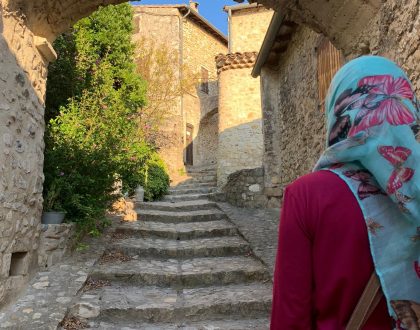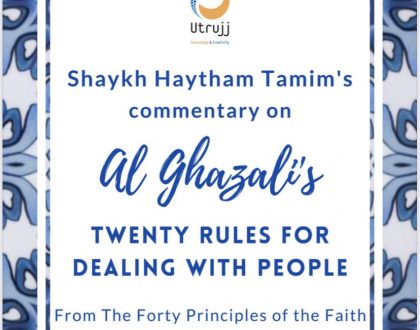Knowing Allah through His Beautiful Names: Al Mu’izz and Al Mudhil
Pairs of names Two of the beautiful names of Allah Almighty are Al-Mu’izz and Al-Mudhill. Al-Mu’izz is the One who gives honour while it’s opposite, Al-Mudhill is the One who humiliates. As we have...
Read More
Knowing Allah through His beautiful names 11: Al Hakam and Al Adl
Bringing Allah’s names into our lives Anything related to Allah Almighty is beautiful. When talking about His attributes and His names, we should reflect on how we can live by His names, and activate...
Read More
Knowing Allah through His beautiful names 10: Al Aleem, Al Baseer and Al Samee’
The vital role of understanding Allah in our lives Our foremost obligation is to know Allah Almighty, and reflecting on His beautiful names helps us to do this. Before any other duty, gaining knowledge...
Read More
Knowing Allah through His beautiful names 9 – Al Fattah
The interconnected meanings of Al-Fattah Al-Fattah is one of Allah Almighty’s names. It has different meanings, but its primary meaning is the Opener, or the One who opens things for you. It also has...
Read More
Ghazali – If you had just one day to live, what would you do?
Munazarat an Nafs – debating with yourself The Forty Principles of the Faith ends with a debate between Ghazali and himself, and he recommends that we do this as well – rather than debating...
Read More
Ghazali on remembering death V – carrying jewels
Acute regret Imagine you are in a dark cave filled with stones, and your friends urge you to pick up the stones and carry them back with you to the exit. You think they...
Read More
Ghazali on remembering death IV
True life is after death وَمَا هَٰذِهِ ٱلۡحَيَوٰةُ ٱلدُّنۡيَآ إِلَّا لَهۡوٞ وَلَعِبٞۚ وَإِنَّ ٱلدَّارَ ٱلۡأٓخِرَةَ لَهِيَ ٱلۡحَيَوَانُۚ لَوۡ كَانُواْ يَعۡلَمُونَ The present life is nothing but sport and amusement. The true life is in...
Read More
Ghazali on remembering death III – aspects of the soul
The People of Allah are disconnected from dunya On the topic of remembering death, dhikr al mawt, Ghazali talks about the people of Allah – those with gnosis – their state, their connection with...
Read More
Ghazali on remembering death I
Remembering Death The tenth and final chapter of The Forty Principles of the Faith is about death. Imam Ghazali chose to end his book, which is a summary of the great tome, Ihya Ulum...
Read More
Ghazali on Contentment with Allah’s Will (part 1)
Allah is pleased with them and they are pleased with Him In Surat al Maidah, Allah Almighty says: قَالَ ٱللَّهُ هَٰذَا يَوۡمُ يَنفَعُ ٱلصَّٰدِقِينَ صِدۡقُهُمۡۚ لَهُمۡ جَنَّٰتٞ تَجۡرِي مِن تَحۡتِهَا ٱلۡأَنۡهَٰرُ خَٰلِدِينَ فِيهَآ أَبَدٗاۖ...
Read More
Ghazali on Reliance (part 2)
Ghazali looks at tawakkul, breaking it into divisions and levels of tawakkul. The essence of tawakkul is putting your trust in Allah which comes from 3 things: The 3 pillars of tawakkul ILM –...
Read More
Ghazali on Reliance
Ghazali lived in 5th century Hijri and his book, Kitaab Al-Arba’in Fi Usul ad-Din, ‘The Forty Principles of the Religion,’ which he wrote before his death, is a summary of Ihya Ulumuddin (Revival of...
Read More
Ghazali on the 6 levels of truthfulness
Ghazali lived in 5th century Hijri and his book, Kitaab Al-Arba’in Fi Usul ad-Din, ‘The Forty Principles of the Religion,’ which he wrote before his death, is a summary of Ihya Ulumuddin (Revival of...
Read More
Ghazali on Sincerity – purify and multiply your intention
Ghazali lived in 5th century Hijri and his book, Kitaab Al-Arba’in Fi Usul ad-Din, ‘The Forty Principles of the Religion,’ which he wrote before his death, is a summary of Ihya Ulumuddin (Revival of...
Read More
Ghazali’s 20 rules for dealing with people
Life is a journey to Allah which we do not pursue alone. We are not an island – we are surrounded by people, friends, family, colleagues, neighbours, those whom we employ and those we...
Read More















